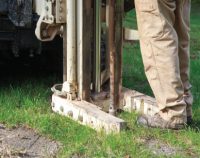Engineer’s Guide to Corrosion-Causes, Protection and Control: 8 PDH
$40.00
SPECIFIC KNOWLEDGE OR SKILL OBTAINED
This course teaches the following specific knowledge and skills:
- Discuss environmental factors that affect corrosion
- Understand the eight major forms of corrosion
- Discuss corrosion characteristics and properties of various common metals
- Explain corrosion protection and methods of control
- Discuss monitoring of corrosion and available inspection technologies
- Understand the electrochemistry, kinetics, and thermodynamics of the corrosion process
CERTIFICATE OF COMPLETION
You will be able to immediately print a certificate of completion after passing a 30 question multiple-choice quiz. The quiz can be retaken unlimited times until a passing grade of 70% or better is earned. This course satisfies eight professional development hours (PDH) of continuing education.
Related Courses
Geotechnical Subsurface Exploration for Roadways: 5 PDH
$30.00 Add to cartIn this course the student will understand the essentials of subsurface explorations for roadways with a comprehensive overview including site preparation, sampling methods, types of testing and methods, as well as standard guidelines and recommendations.Instructor: Raymond Bosek, PESPECIFIC KNOWLEDGE OR SKILL OBTAINED
This course teaches the following specific knowledge and skills:
- Discuss preparing for subsurface explorations
- Explain field reconnaissance and setting-up a exploration program
- Discuss sampling techniques and tools
- Explain various tests in addition to the standard penetration test (SPT)
- Understand guidelines for minimum exploration
CERTIFICATE OF COMPLETION
You will be able to immediately print a certificate of completion after passing a 20 question multiple-choice quiz. The quiz can be retaken unlimited times until a passing grade of 70% or better is earned. This course satisfies five (5) hours of professional development (PDH).
Preview CourseClick “Preview Course” to view prior to purchaseClick “Add to Cart” to purchaseDesign and Construction of Road Tunnels-Part 1 Planning: 5 PDH
$30.00 Add to cartIn this course the student will come to understand a general overview of the planning process of a road tunnel project, geometrical requirements and recommendations of new road tunnels, investigative techniques and parameters required for planning, construction and design of road tunnels, and the different types of reports required for a road tunnel project.Instructor: Raymond Bosek, PEIn this course the student will come to understand a general overview of the planning process of a road tunnel project, geometrical requirements and recommendations of new road tunnels, investigative techniques and parameters required for planning, construction and design of road tunnels, and the different types of reports required for a road tunnel project.SPECIFIC KNOWLEDGE OR SKILL OBTAINED
This course teaches the following specific knowledge and skills:
- General tunnel design parameters
- Alternative analyses
- Tunnel studies
- Operation and financial planning
- Geometric configurations
- Geotechnical investigations
- Geotechnical Reports
CERTIFICATE OF COMPLETION
You will be able to immediately print a certificate of completion after passing a 30 question multiple-choice quiz. The quiz can be retaken unlimited times until a passing grade of 70% or better is earned. This course satisfies five (5) professional development hours (PDH) of continuing education.
Preview CourseClick “Preview Course” to View Prior to PurchaseClick “Add to Cart” to Purchase and Access Quiz




